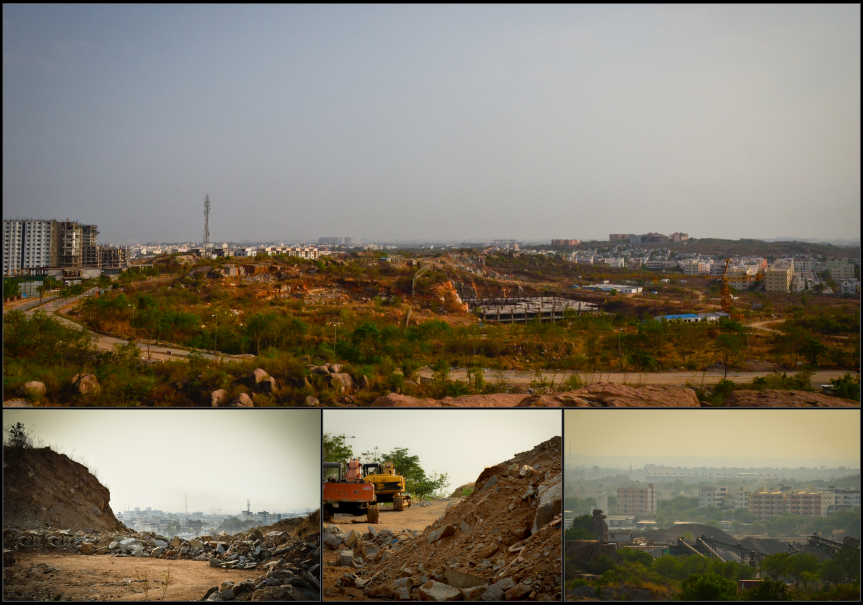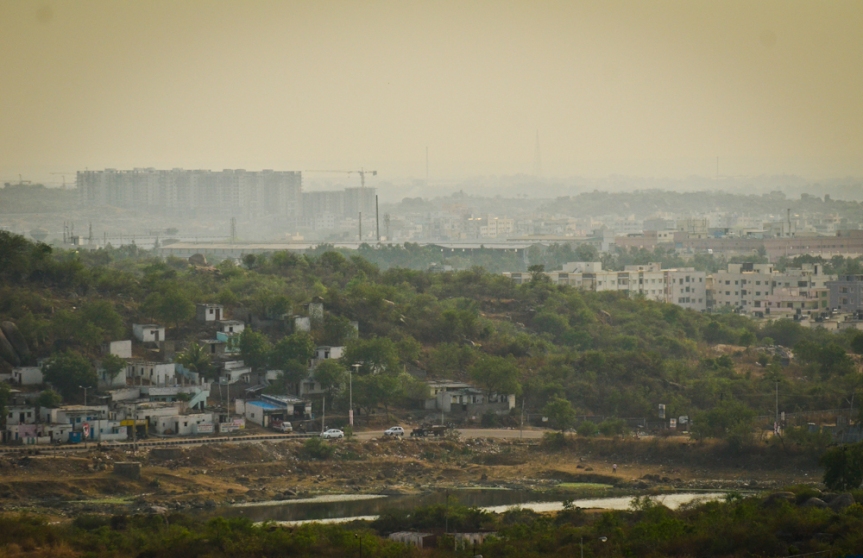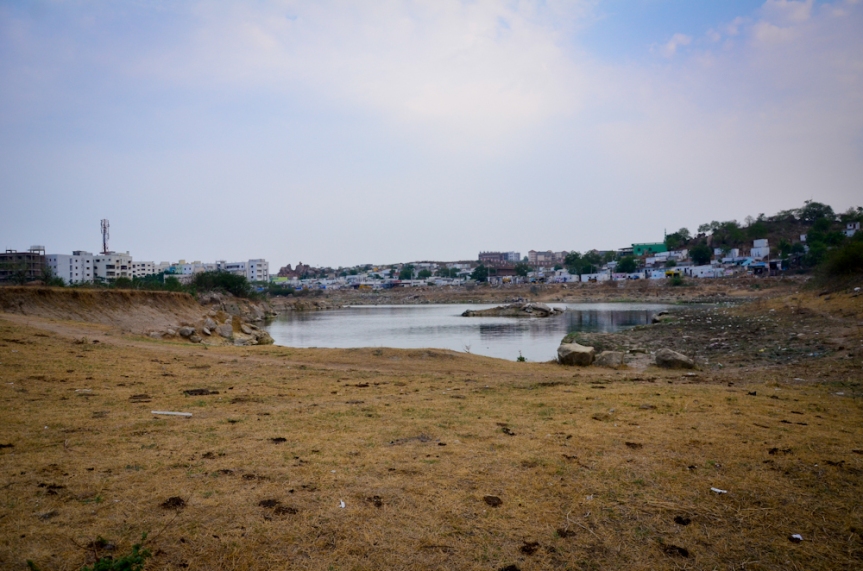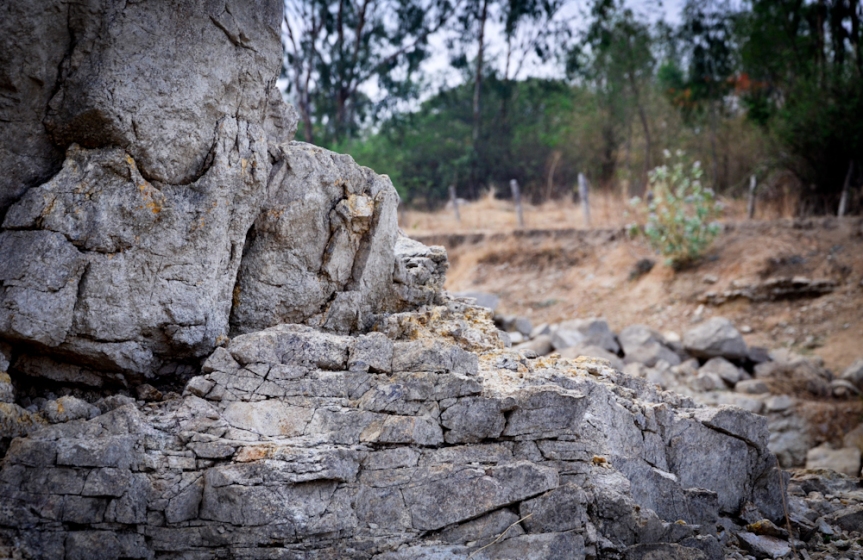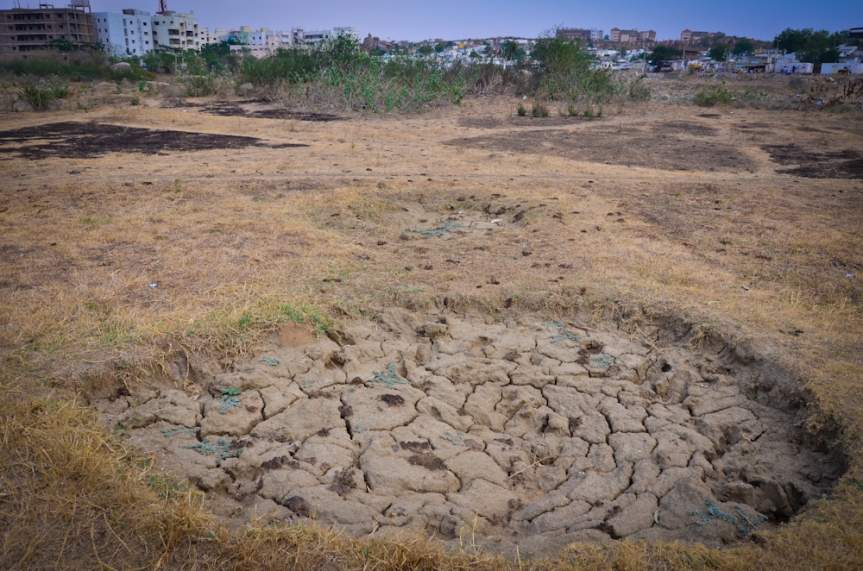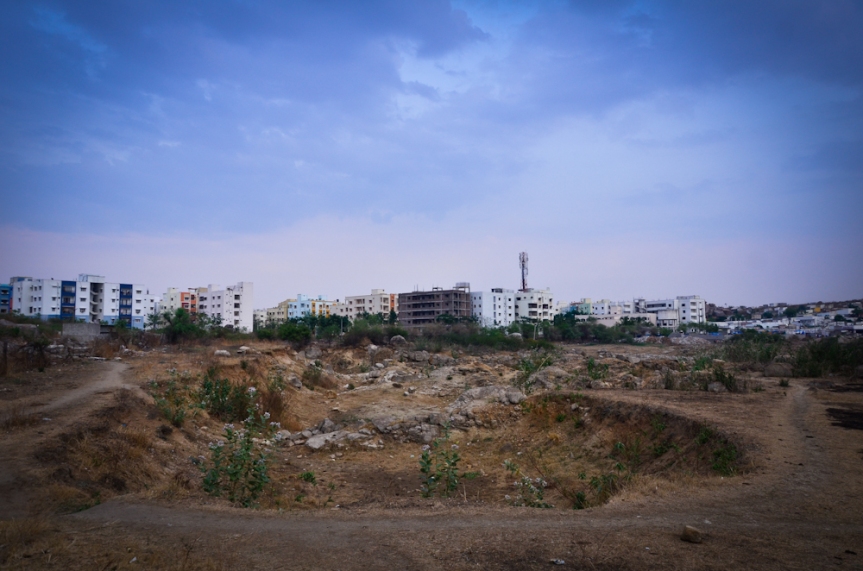“Every story told is carved from something so much bigger” – Tim Parks.
I live in an area that is at the epicenter of real estate boom, I like to believe we are at the edge of a concentric growth. The kind of growth that qualifies for ‘good & continuous’ economic development, the kind that supports micro & macro economies, these economies in-turn sustain the general populace and therefore boom in the real estate. And for our part we rejoiced at this growth. We walked taller when they opened the call center capital, Hitech city. When the then Government relaxed FDI policies and offered incentives to set up companies here, we embraced the move that generated plethora of opportunities for the people. We were jubilant at the opening of the first mall, our shiny credit cards were at the ready as were our shopping lists. We puffed up our chests in mock pride when they opened the next experience in movie watching, IMAX. We were absolutely thrilled at the inauguration of necklace road, long drives along necklace road suddenly became the in-thing. They came in seven and eights on two wheelers and four wheelers could switch gears from 2nd to 3rd quite comfortably. Spending power was on the rise, cars got swankier and the crowd was more cosmopolitan than ever. Then incumbency changed the tides. A different party with a different mandate, this one mostly aimed at rural development. We saw mobile revolution in the rural segment and heard their jubilation at the development of their land, we in-turn lauded them for their acceptance, fewer farmers took their lives that year (whether owing to support from CSR/NGO activities or the Govt policies is a debate in itself) changes were poised to take over, a tragedy struck and the entire state was caught in the claws of regionalism and the economic development showed a negative trend, but this is not my worry. Atleast not my principal worry. Political parties come and go, mandates come and go, developmental priorities and their fickleness come and go but environmental costs and environmental refugees are here to stay.
While the conduct of economic itself is laden with capitalistic tendencies, trading environment and it’s progenies as mere commodities has led to serious environmental deterioration and gradual ecosystem decline.
If this world was given an Aladin’s lamp now, he would probably say “Hey, I only got three wishes to grant. You have Climate change, resource & water scarcity, food security, population growth, urbanization, environmental deterioration, wildlife culling..and what not. If I were you, I would use the three wishes to find more genies to fix all these problems.” The scene my imagination concocts is at best incredulous. The situation itself is by far quite disturbing. The environmental costs which no financial statement accounts for are borne by society at large. Tragedy of Commons. And the commons need to be worried about this ongoing tragedy because growth for the sake of it can only put immense pressure on resources and food, a scenario which can only redefine inflation, a strain of different kind. For the businesses, well a different kind of challenges lay ahead, every approval for a new project would be met with more complex orb of legal hassles and why not!
Pish posh you might say. The world has been coming to an end since it became cool to say “the world is coming to an end”. My response to the pish posh feeling, well there just might be environmental refugees of a different kind.
What then would make a compelling case for environmental refugees? What would highlight environmental costs? Followed by the most pivotal question, where is the evidence?
Open fields in the area that I live close to is still a robust resource. For the villagers it’s a grazing ground for their milking cattle, for the real estate gunners it’s a milking machine. Once the field is sold to the real estate gunners, the villagers feel the stress of limited access to a resource. They either become victims of uncertainty or migrate farther away from the growing ebb of urban lands. Ask them what they think of this – “It has always been about you people, we don’t matter in this scheme of things. Houses for you are more important. Even if we have documents to prove this is our land, it won’t matter. I’m tired of blaming my fate. You want me to go on record? Why? What would it change? I’ll just be another name in your project. I will not beg anyone to help me keep my house. They promise money, we never get it. Why should I fight? Not fighting doesn’t mean I’ve given up, it just means I have more energy to make ends meet.”
The hidden cost that no new project covers. The displaced people that no one cares to rehabilitate. The open fields that may never come back. The balance that keeps moving farther away from optimal.
Often times people are blamed for their micro-vision, we see what we want to see and tend to pilot all thoughts in that very direction. We are duly advised to look at the bigger picture and then told to make our own decisions or choices. We then are free to establish a belief system. So for a look of the bigger picture, I stood at the highest point and took in the scene. The world appears beautiful in the night with twinkling night lamps, bulbs and tubes from every household, I had to come back during the day. This scene in a valley, up in the hills or mountains would take our breath away, night or day. It’s still seeped in the wonderful green, bathed in the mountain’s glorious shadow. But here back in the city, the changing hues of the sun wouldn’t make this picture any warmer, the white balance of this picture would be a hard cold.
I did cringe at the thought of environmental costs we are amassing. Am I sure that these projects don’t consider environmental prices, I haven’t looked at their balance sheets, no. Am I certain this is permanent irreversible damage? Maybe yes and maybe no. Is this costing us a healthy robust environment? Perhaps. Time will tell. Is this creating refugees out of the local fauna? A question to ponder over.
This story also began from something bigger. A lot has been said and written about Conservation, Environment and it’s importance. Much of whatever has been written is met with mute cynicism. It’s an irreverent and an attenuated case they say. So I speak of this lake, once one among the many. The last one along the stretch of this road, geographically and schmaltz-ily. I first noticed this lake when I was driving by and a group of cormorants flew by above me and landed near the edge of this lake, sitting by the edge of this lake was a pair of grey pond heron and a purple heron. Young Coots were everywhere as were the egrets and pond herons, it seemed to play a perfect host. However, this last one year I have helplessly observed the deterioration of what could have been a beautiful natural lake for this area. For me this lake serves as a prototypical example for the ‘state of affairs’ overall.
The predominant feature in the view above is this lake for me. From a distance it seems ideal.
Don’t you agree ?
This is where the lake is supposed to begin where I’m standing. I’m up close, technically in the lake. On my right is the dumping ground for the village close by and the left is the dried up end of the lake. Or still drying up end of the lake. And at the farther end is the growing ebb I talked about earlier. It becomes clear that this is a water source for the village.
The flora and fauna around it are now competing for this resource.
From garbage along the edge of the lake to water tankers, the quality of this resource for the original occupants may throw up some cause for concern. The several horizontal lines are indicative of the levels the water table was at. Increasing temperatures and decreasing rains do nothing to circulate this system.
Environmental refugees.
The topography is mildly broken up in places creating little stagnant puddles that can only be recycled if it rains. The stress on terra firma from growing infrastructure, costs that are borne by society is general and cannot be distilled into a number.
Intangible costs.
A walk around the puddle and the view clears out into this. Lakes can provide a variety of ecological services. This lakes seems to have been rendered unfit for any kind of ecological services for the present.
The variables keep adding each year as are the odds for focused lake conservation.
We then climbed down into what would’ve been the depths of the lake. It was almost riveting to imagine the flow of the water and the way water would have gurgled near where I stood.
Encroachments and land exploitation seems to have resulted in shrinkage, erosion impacting the lake’s hydrology, water quality and bio diversity.
What should’ve been softened by the flow of water over these rocks have been hardened in time. Exposure to climbing temperatures can only make these rocks hard. Adaptability one can call it. Ah diamonds come from rocks.
I just see a crumbling ecosystem. My perspective.
An ecosystem is a dynamic complex of plant, animals and microorganism communities and their nonliving environment interacting as a single functional unit. Ecosystems can vary in size, from a pond a tree hollow to an ocean basin, they are all ecosystems, all playing a pivotal role in nurturing the participants of the ecosystem and carries considerable benefits for the human beings as indirect recipients. In this lake’s case and the little ecosystems it did to support, there’s just cracks.
Environmental refugees and hidden environmental costs. Shouldn’t we push for businesses to make sustainability innate to their functioning. Would that address an issue? Would it help if Governments actually pushed for higher regulatory standards and even higher incentives to imbibe sustainability into their operations? Just to slow down the process of degradation?
And this is where the lake ends. Rather, where it should. If only we learnt to manage ecosystems and biodiversity better in the cities. There is no price but only costs..when it comes to Environment. Our lifestyle choices may yet create more environmental refugees with each day. Strangely enough we continue to treat it as a tradable commodity.
Evidence enough for a compelling case?

